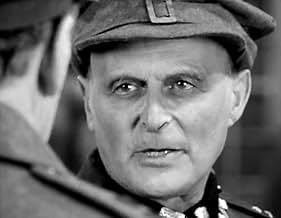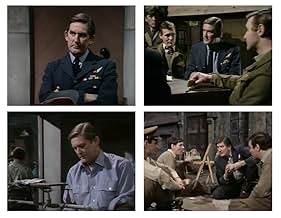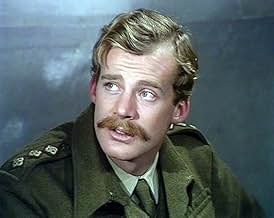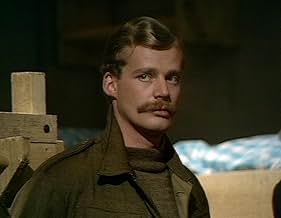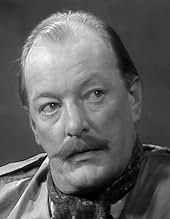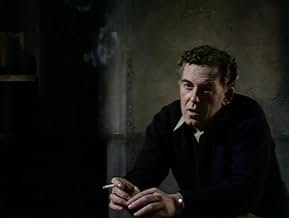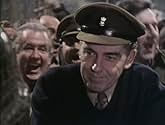Colditz
- Fernsehserie
- 1972–1974
- 50 Min.
IMDb-BEWERTUNG
8,3/10
1097
IHRE BEWERTUNG
Die Gefangenen im Schloss Colditz unternehmen viele Versuche, der Gefangenschaft durch die Ankunft der ersten britischen Gefangenen nach Dünkirchen im Jahr 1940 zu entkommen.Die Gefangenen im Schloss Colditz unternehmen viele Versuche, der Gefangenschaft durch die Ankunft der ersten britischen Gefangenen nach Dünkirchen im Jahr 1940 zu entkommen.Die Gefangenen im Schloss Colditz unternehmen viele Versuche, der Gefangenschaft durch die Ankunft der ersten britischen Gefangenen nach Dünkirchen im Jahr 1940 zu entkommen.
- Nominiert für 3 BAFTA Awards
- 1 Gewinn & 3 Nominierungen insgesamt
Folgen durchsuchen
Empfohlene Bewertungen
Watched this as a kid and then a few years ago, and am now binge watching again. After the first 3 parts that get the men to Colditz, this is one of the finest things the BBC ever did. The acting throughout is quite brilliant, with the passing of time - so hard to capture - superbly done. The exchanges between Jack Hedley and Bernard Hepton are some of the finest in the history of British TV.
When the very popular and succesful "Family at War" series finished a new wartime drama was made about the stories and exploits of British prisoners of war being held at Oflag 4c known as Colditz. This BBC production ran two seasons from 1972 to 1974 and although repeated, perhaps twice, it wasn't shown again after it's final airing in 1975 until it was broadcast on UK Gold many years later. The series mostly centered around the British contingent and was filmed mostly on video which only added to the claustrophobic feel of being incarcerated. This castle deep inside Germany was used as a POW camp to house highly decorated or prominent captured service men as well as troublesome officers who were well known escapers. Other nationalities included French, Dutch, Polish as well as Americans.
The German captures were headed by the Kommandant a veteran of WW1 and strictly by the book man. Straight backed a committed patriot but dignified, took his responsibilities very seriously and felt that observing the Geneva convention was vital in helping German POW's deal with their captivity in allied POW camps, therefore, he was tough but fair. This was clearly on display when he finally understood Colonel Preston's predicament after the death of his wife in England and the compassionate act of not returning a letter with other personal effects to a dead serviceman's wife, giving the impression he'd never received the last letter.
He was supported by the very imposing Hauptmann Ulmann his security chief who was also committed to his duties but nevertheless earned the respect of the POW's as he too observed the Geneva convention. This was in sharp contrast to the Second in command Major Mohn who came in the second season. He was committed to the cause but arrogant as well as being a strong party member who had connections with the hierarchy in the Nazi movement. Although decorated and wounded in combat because of his underhanded methods towards his duties and his constant provocation towards the prisoners he eventually became despised.
The series found its feet in the 4th episode of the first season which centered on the arrival of Colonel Preston who became the senior British officer. After some initial resistance from the British prisoners, he soon gained the respect of them. Through his ability to command he brought a sense of purpose and discipline to the officers by initiating a rotation of officer of the day, daily orders being posted and the forming of an escape committee. The other main senior British officers were Captain Pat Grant the head of the escape committee, Flight Lieutenant Carrington, submariner Lieutenant Dick Player and the short tempered and moody flight Lieutenant Carter.
Despite the first series climaxing on a two-part episode with an attempted break out of four British officers, I think that season two was just slightly better, probably benefiting from the presence of the nasty Major Mohn. Two seasons were probably enough for the series and ended with the war coming to an end with the United States and Russian forces closing in on the castle. I think that a short 2-3-part miniseries a few years later centering around a reunion of some of the officers with the intention of tracking down Horst Mohn and trying to bring him to justice would have been satisfying. It didn't happen, nevertheless a great series to watch, I'd highly recommend Colditz.
The German captures were headed by the Kommandant a veteran of WW1 and strictly by the book man. Straight backed a committed patriot but dignified, took his responsibilities very seriously and felt that observing the Geneva convention was vital in helping German POW's deal with their captivity in allied POW camps, therefore, he was tough but fair. This was clearly on display when he finally understood Colonel Preston's predicament after the death of his wife in England and the compassionate act of not returning a letter with other personal effects to a dead serviceman's wife, giving the impression he'd never received the last letter.
He was supported by the very imposing Hauptmann Ulmann his security chief who was also committed to his duties but nevertheless earned the respect of the POW's as he too observed the Geneva convention. This was in sharp contrast to the Second in command Major Mohn who came in the second season. He was committed to the cause but arrogant as well as being a strong party member who had connections with the hierarchy in the Nazi movement. Although decorated and wounded in combat because of his underhanded methods towards his duties and his constant provocation towards the prisoners he eventually became despised.
The series found its feet in the 4th episode of the first season which centered on the arrival of Colonel Preston who became the senior British officer. After some initial resistance from the British prisoners, he soon gained the respect of them. Through his ability to command he brought a sense of purpose and discipline to the officers by initiating a rotation of officer of the day, daily orders being posted and the forming of an escape committee. The other main senior British officers were Captain Pat Grant the head of the escape committee, Flight Lieutenant Carrington, submariner Lieutenant Dick Player and the short tempered and moody flight Lieutenant Carter.
Despite the first series climaxing on a two-part episode with an attempted break out of four British officers, I think that season two was just slightly better, probably benefiting from the presence of the nasty Major Mohn. Two seasons were probably enough for the series and ended with the war coming to an end with the United States and Russian forces closing in on the castle. I think that a short 2-3-part miniseries a few years later centering around a reunion of some of the officers with the intention of tracking down Horst Mohn and trying to bring him to justice would have been satisfying. It didn't happen, nevertheless a great series to watch, I'd highly recommend Colditz.
"Colditz" was shown here in Finland as a rerun in 1997-98. It was based on the books "Colditz and the Latter Days" by Pat Reid which tell the story of a group of Allied POWs who have been sent to the most heavily guarded prison camp in Germany.
The series was so good that I did not miss a single show of it, I also bought the books on Colditz written by Reinhold Eggers (known as Ullmann in the series) and Pat Reid.
The series show how the POWs had to live in Colditz, a few went insane some died while trying to escape and some made a succesful escape. The series is among the best when it comes to drama.
The series was so good that I did not miss a single show of it, I also bought the books on Colditz written by Reinhold Eggers (known as Ullmann in the series) and Pat Reid.
The series show how the POWs had to live in Colditz, a few went insane some died while trying to escape and some made a succesful escape. The series is among the best when it comes to drama.
I watched this on T.V. as a Kid, IN PARTICULAR i liked the character played by Bernard Hepton as the commandant and can remember as if it was yesterday this unique part, right down to the frequent clearing of the throat and his general manner, i can never recall missing an episode and used to look forward to it being screened every week, needless to say i was very disappointed when the Series came to an end and would love to own the whole series, Anyone out there know if this was ever released on Video or D.V.D. and if so where it can be obtained OR WHEN IT MAY BE RE-SCREENED IN THE FUTURE ?
Please let me know if any one notices it popping up on the History Channel again in the future, Gary@ichthus88.force9.co.uk, Thanks in advance Cheers - Gary
Please let me know if any one notices it popping up on the History Channel again in the future, Gary@ichthus88.force9.co.uk, Thanks in advance Cheers - Gary
This outstanding series is the kind of psychological drama at which the British excell. Set almost entirely within a reconstruction of the now-famous castle-fortress prisoner-of-war camp during WWII, there is little in the way of physical action. Instead we're treated to some of the best form of "mind games" and psychological manoeuvring and competition you can hope to see on TV, as the two sides constantly strive to get one over on the other. The Allied prisoners are determined not to be beaten mentally by their surroundings and look for every possible means of escape, while the Germans are always on their toes, looking for clues about possible break-outs and ways in which the Allied prisoners are trying to outsmart them. I couldn't tear myself away from the series when it first came out in Britain, and I was pleased to see how little it had aged when it was reshown on the History Channel a couple of years ago. Excellent acting and strong story lines make this a must-see for me. Out of 10, I'd rank it about 13.6!!
Wusstest du schon
- WissenswertesThe series takes place from May 1940 to April 1945.
- PatzerAll of the prisoners are seen dressed in impeccable uniforms, from uniform caps with insignia down to highly polished boots. The shirts and pants are clean and pressed, and the senior officers even have ties. None of these would have been carried into battle, and even if they had been, would surely have shown signs of wear after years in prison camps. In reality the prisoners had to make due with whatever they could gather together, certainly not the high quality uniforms featured in the series.
- VerbindungenFeatured in Night of a Thousand Shows (2000)
Top-Auswahl
Melde dich zum Bewerten an und greife auf die Watchlist für personalisierte Empfehlungen zu.
- How many seasons does Colditz have?Powered by Alexa
Details
- Erscheinungsdatum
- Herkunftsland
- Sprachen
- Auch bekannt als
- La fuga de Colditz
- Drehorte
- Stirling Castle, Stirling, Schottland, Vereinigtes Königreich(Title sequence and exteriors)
- Produktionsfirmen
- Weitere beteiligte Unternehmen bei IMDbPro anzeigen
Zu dieser Seite beitragen
Bearbeitung vorschlagen oder fehlenden Inhalt hinzufügen


